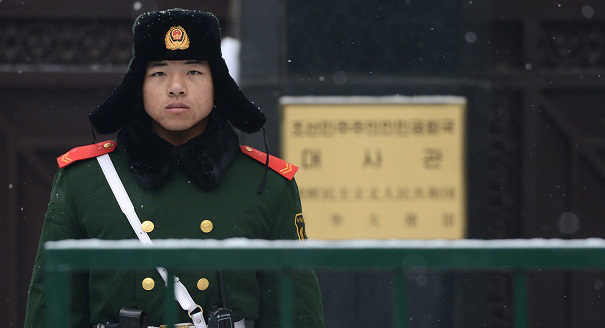James L. Schoff, Douglas E. Rake, Joshua Levy
{
"authors": [
"James L. Schoff"
],
"type": "legacyinthemedia",
"centerAffiliationAll": "dc",
"centers": [
"Carnegie Endowment for International Peace",
"Carnegie China"
],
"collections": [
"China’s Foreign Relations",
"U.S.-China Relations"
],
"englishNewsletterAll": "asia",
"nonEnglishNewsletterAll": "",
"primaryCenter": "Carnegie Endowment for International Peace",
"programAffiliation": "AP",
"programs": [
"Asia"
],
"projects": [],
"regions": [
"East Asia",
"China",
"North Korea"
],
"topics": [
"Security",
"Military",
"Foreign Policy",
"Nuclear Policy",
"Arms Control"
]
}
Source: Getty
What Next With North Korea?
After weeks of escalating rhetoric, tensions between North Korea and the United States appear to be easing. But what prompted Pyongyang’s recent provocative statements?
Source: CNN
After weeks of escalating rhetoric, tensions between North Korea and the United States appear to be easing. But what prompted Pyongyang’s recent provocative statements? How well did the U.S. handle the threats? And what role has China played? James Schoff (@SchoffJ), a senior associate on the Carnegie Endowment for International Peace’s Asia Program, answers readers’ questions:
Could Kim Jong Un's recent statements simply be an effort to save face with his own military before entering negotiations, asks “wjm”?
Perhaps to some extent, but there is no reason to think Kim’s idea of “negotiations” are anything close to what would be acceptable to South Korea or the United States. He seems to have gone “all in” with the further pursuit of nuclear weapons and long-range missiles, which is prompting increased international pressure. So, North Korea's recent threats and military maneuvers are aimed more at bolstering its deterrence and pushing back against this pressure, rather than an opening gambit for talks. If an opportunity for talks emerges, Kim’s goal appears to be gaining some degree of international recognition for North Korea's nuclear status or reducing the bite of current sanctions.
When young Kim took over the leadership role after his father died in late 2011, there was some hope that he might steer the country toward more focus on economic modernization and away from emphasizing the nuclear program. That has proven to be a false hope.
The recent bellicose rhetoric seems to have died down since the celebration marking the 101st anniversary of Kim Il-sung’s birth, says “j. von hettlingen.” Do you think China been playing a part behind the scenes?
China is certainly active on this front, and a good example of this is the current Washington visit by Chinese special envoy Wu Dawei, his first trip to the United States since 2010. China is encouraging North Korean restraint, and even though Beijing's influence is limited, it might be contributing to a reduction in rhetoric from Pyongyang. China is also urging the United States to find some flexible way to enter discussions with the North. Even if the talks don't lead to denuclearization, they could provide Kim Jong Un with face-saving way to back down. But talks toward what end?
Even China is beginning to doubt Kim's potential willingness to freeze his nuclear and missile programs, which could threaten regional stability in the long run more significantly than confronting North Korea. China is not yet willing to use all of its leverage on North Korea to try to change its behavior, lest it provoke conflict or precipitate collapse on the Peninsula, but I sense that China’s patience is wearing thin. The question is whether or not this will manifest in concrete actions such as stronger enforcement of international sanctions against the North. Signs are limited on this front so far.
How well do you feel the Obama administration has managed recent tensions?
It has done a reasonably good job, but the administration needs to invest time in forging a more concrete and coordinated policy going forward. Current shuttle diplomacy efforts should be focused on this purpose.
The challenge for Washington is that it has competing goals. It wants to send a strong deterrence message to North Korea to prevent miscalculation, as well as reassure allies like South Korea and Japan that it won't forget about their interests or get soft on North Korea. At the same time, however, it wants to avoid escalating tensions while containing or freezing the North’s nuclear programs, if it can’t eliminate them altogether. The sometime contradictory steps it has taken – such as conducting bilateral exercises with South Korea including U.S. nuclear-capable bombers, while postponing a separate long-range missile test – reflect this dilemma. The messages delivered during Secretary of State Kerry's recent trip to the region should have been clearer. It danced awkwardly around the idea of offering talks to North Korea, and Kerry's team probably needed some additional preparation to coordinate messaging in advance. The Obama administration should stay patient and consistent with its policy of demanding North Korean denuclearization while opening the door for talks to discuss how that can be accomplished to mutual satisfaction. It is important to stay closely aligned with South Korea and Japan.
Do you expect to see another escalation in tensions in the near future, asks Matthew Tucker?
I do, unfortunately. The United States and its allies are not willing to move from their insistence for North Korean denuclearization, and Pyongyang does not look ready to budge either. Even if North Korea does not launch a direct military attack on South Korea, as it has done in the past, it could go ahead with more missile or nuclear tests, cyber-attacks, or some other provocation. The issue of the Kaesong Industrial Complex is still outstanding as well. The North has shut the North-South economic venture down for weeks, and many South Korean citizens are still there, hoping to be able to restart their businesses. If Kaesong restarts, then we are headed in a good direction, but the longer it stays closed, the more irreparable becomes the damage between North and South Korea.
Is there anything else, covertly or overtly, the U.S. and its allies can do to put pressure on the North Korean regime, asks H. Bruce Downs III on Facebook?
This has turned into a long-term struggle, so the United States and its allies should adopt a common long-range strategy. Their strategy must include continued pressure on the North (possibly new financial sanctions), but it cannot be too provocative, lest they alienate China and Russia and undermine the regional solidarity that has been so important in constraining North Korean actions.
North Korea has endured international sanctions in the belief that once it develops nuclear weapons, the world will have to back down and accept it as a nuclear power. The U.S. and its allies must strive to convince the North’s leadership that this will never happen and that nuclear weapons are actually harming its interests and the regime's viability. At the same time, it will need to help Kim and his cohorts envision an alternative future wherein they can follow the so-called China model and create a one-party government administering economic reform and openness. I’m skeptical that the North Korean military will recognize this opportunity, but the U.S. should lead collective work in the region to contain the North Korean military threat while trying to engage economically and undercut regime legitimacy from within. There should also be focus on getting more information about the outside world into North Korea, by whatever means possible.
What are your thoughts on the U.S. allowing South Korea to completely take over its own defense and lead the relationship with North Korea, asks Lorraine Alden on Facebook? Would it be possible, and would it be in our interests to do so?
Absolutely. South Korea has the financial, technical, and organizational means to deter North Korea and defend itself, as long as it continues a close alliance partnership with the United States. U.S. resolve to support South Korea will not waver – and the U.S. commitment of troops and resources to South Korean defense will continue – but it is time for South Korea to assume its rightful place as the primary lead for its own defense. North Korean propaganda thrives on the myth that South Korea is still some sort of puppet regime under the thumb of the Americans. Returning war-time operational control of South Korean forces to Seoul would demonstrate once and for all that the path to true peace on the Korean Peninsula runs through Seoul, not Washington. The Republic of Korea is an independent and influential global leader, and the North will get nowhere if it cannot understand this. On the flip side, North Korea is a morally bankrupt failing state that is deepening its own isolation. A cornered regime like this must be dealt with carefully but resolutely.
About the Author

Former Senior Fellow, Asia Program
James L. Schoff was a senior fellow in the Carnegie Asia Program. His research focuses on U.S.-Japan relations and regional engagement, Japanese technology innovation, and regional trade and security dynamics.
- A High-Tech Alliance: Challenges and Opportunities for U.S.-Japan Science and Technology CollaborationPaper
- What’s the U.S. Take on Russia-Japan Relations?Commentary
James L. Schoff
Recent Work
Carnegie does not take institutional positions on public policy issues; the views represented herein are those of the author(s) and do not necessarily reflect the views of Carnegie, its staff, or its trustees.
More Work from Carnegie Endowment for International Peace
- Iran Is Pushing Its Neighbors Toward the United StatesCommentary
Tehran’s attacks are reshaping the security situation in the Middle East—and forcing the region’s clock to tick backward once again.
Amr Hamzawy
- The Gulf Monarchies Are Caught Between Iran’s Desperation and the U.S.’s RecklessnessCommentary
Only collective security can protect fragile economic models.
Andrew Leber
- Duqm at the Crossroads: Oman’s Strategic Port and Its Role in Vision 2040Commentary
In a volatile Middle East, the Omani port of Duqm offers stability, neutrality, and opportunity. Could this hidden port become the ultimate safe harbor for global trade?
Giorgio Cafiero, Samuel Ramani
- Europe on Iran: Gone with the WindCommentary
Europe’s reaction to the war in Iran has been disunited and meek, a far cry from its previously leading role in diplomacy with Tehran. To avoid being condemned to the sidelines while escalation continues, Brussels needs to stand up for international law.
Pierre Vimont
- Governing Aging Economies: South Korea and the Politics of Care, Safety, and WorkPaper
South Korea’s rapid demographic transition previews governance challenges many advanced and middle-income economies will face. This paper argues that aging is not only a care issue but a structural governance challenge—reshaping welfare, productivity, and fiscal sustainability, and reorganizing responsibilities across the state, private sector, and society.
Darcie Draudt-Véjares








